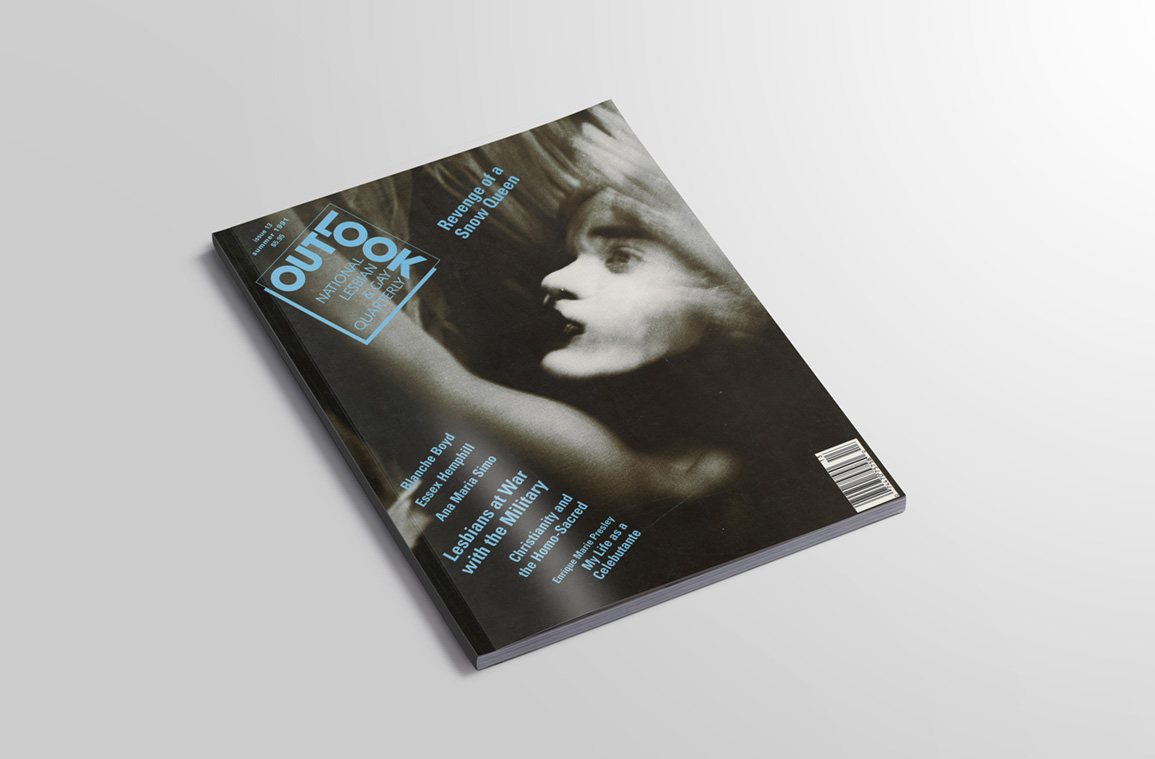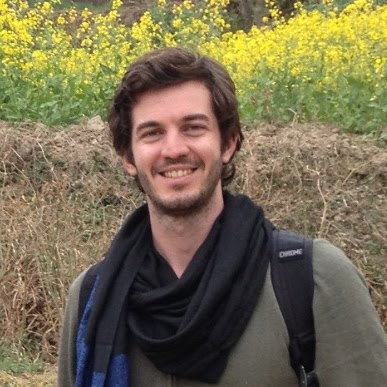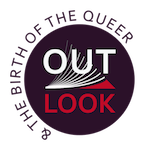
My contribution is triggered by a quote from the editorial of the main feature in Issue 13 on lesbians in the military: “why not fight militarism rather than military discrimination? This is the debate that is expanding in our communities as soldiers and ROTC cadets come out in greater numbers and as our government wages ‘little’ wars […] that now rival World War II in destruction.” I think that this concern is as timely now as it was in 1991, and my piece attempts to account for major queer voices in this debate in the intervening twenty-six years.
In 1990 Free Press published Allan Bérubé’s Coming Out Under Fire, a history of gays and lesbians during the Second World War. The wide-ranging discussion that the book generated, which branched out from gay organizing to wider political and policy circles, and the archives that Bérubé reviewed, provided the material for a special section on “Lesbians at War with the Military” in OUT/LOOK Issue 13 (Summer 1991), which he co-edited with Rebecca Isaacs. Together with recounting fascinating accounts of lesbian lives in the military since WWII, and criticizing then-President George H.W. Bush’s government for its lack of actions to acknowledge the contributions of gay and lesbian military personnel, the special section raised a key question about the aim and focus of LGBT organizers’ attention to the military. Isaacs and Bérubé, aware of the multiple and divergent voices within the LGBT community in the 1990s, ask: “why not fight militarism rather than military discrimination? This is the debate that is expanding in our communities as soldiers and ROTC cadets come out in greater numbers and as our government wages ‘little’ wars […] that now rival World War II in destruction” (14-15).
A quick answer might contend that this is because we have the ammunition to fight military discrimination, at least in the context of the United States. Legal procedures and existing institutions that legitimize patriotism and individual freedom give us direct avenues to do so. Fighting militarism requires shifting the social and political narratives upon which rest both the emergence of the nation-state in the eighteenth century and American exceptionalism in the nineteenth. In the issue, the question is mostly rhetorical. The editors acknowledge that they are skating on thin ice by focusing disproportionately on one side of the debate. Indeed, queer voices have emerged in the twenty-seven years since Coming Out Under Fire and the OUT/LOOK issue were first published that challenge its underlying assumptions. They do so not so much by debunking militarism, but by questioning the uses of LGBT people to the U.S. nation-state and its military apparatus—and vice versa.
Allan Bérubé was a community-based historian without academic affiliations and the sources of funding that they control. His work, nonetheless, is meticulously researched and well-argued. His prose is lively and engaging, making his book accessible to a non-specialist audience. Coming Out Under Fire recounts the stories of many queer men and women who enlisted in the U.S. military during the Second World War, out of patriotism and boredom, wanderlust and fear of coming out. These stories reveal a dense web of official and unofficial narratives of how sexuality and the military apparatus became entangled in a game of hide and seek, double significations, punitive measures, and as-yet unimagined freedom for many young enlistees.
Bérubé shows World War II to be a pivotal moment for the birth of the modern gay and lesbian movement. Additionally, his book maps out how military psychiatrists played a central role in defining homosexuality for the first time as a personality type that made men and women a priori unfit for military service. They “forced military officials to develop an expanding administrative apparatus for managing homosexual personnel that relied on diagnosis, hospitalization, surveillance, interrogation, discharge, administrative appeal and mass indoctrination” (Bérubé 2). At the same time, these disciplinary mechanisms were productive in the sense that through such diagnostics and labels, many gay, lesbian, and bisexual service members identified themselves for the first time. Many developed communities to protect each other. Margot Canaday’s The Straight State (2009) elaborates on the obsessive fascination of government with the regulation of citizens’ sexuality and how, in the second half of the twentieth century, LGBT groups used the language of the administrative apparatus to turn the tables and fight their exclusion from state institutions. Canaday asserts that LGBT people in large part became a rights-seeking political minority through this process.
In their introduction to the 20th anniversary reissue of his book, D’Emilio and Freedman recount Bérubé’s personal involvement with the fight to end sexual discrimination in the U.S. military. Bérubé often travelled across the country to present his research with slide presentations in public venues and private homes. Much of the material for Coming Out Under Fire came from his encounters with veterans with an interest in this history. Such LGBT community members entrusted Bérubé, a conscientious objector of the Vietnam War with an anti-militarist worldview, with numerous personal accounts of gay and lesbian discrimination and defiance, and he felt that he had to tell their stories (D’Emilio and Freedman, ix). As he became increasingly steeped in the details of the lives of gays and lesbians in the military, especially as they related to the pivotal moment that WWII represents in U.S. history, he was invited as an expert on television panels, legal task-forces, and political committees.
Bérubé and Isaac’s special section in OUT/LOOK included a letter to then-president H. W. Bush and information on how the community could take political action to overturn the ban on gays and lesbians serving in the military. This dovetailed with Bill Clinton’s 1992 presidential campaign, in which there was a brief period of optimism for imminent change as he promised to repeal the ban.
After winning the presidency, Clinton faced staunch opposition by the Joint Chiefs of Staff and eventually reneged on this promise. Bérubé was involved with the campaign to challenge the military’s policy on homosexuality at the invitation of Senator Ted Kennedy (D-Mass.). He prepared several pages of remarks for a congressional hearing which never took place (D’Emilio and Freedman, xii). In the end, the outcome of the Clinton-era debates was the “Don’t Ask, Don’t Tell, Don’t Harass, Don’t Pursue” policy, which banned openly gay, lesbian, and bisexual citizens from enlisting or serving, while others in service were to avoid raising questions about military personnels’ sexual orientation, and the military was to stop taking punitive measures against personnel based on perceived sexual orientation. Bérubé, like most of the LGBT community, was disappointed with this outcome. He described this policy as representing “not ‘half a loaf’ … not even a crumb” (D’Emilio and Freedman, xii).
It would take another Democratic president and nearly two decades of LGBT advocacy to repeal “Don’t Ask, Don’t Tell” in 2010, four years after Bérubé’s death. Barack Obama’s administration considered the policy a violation of military personnels’ individual freedoms. Substantial research had debunked the assumption that openly homosexual and bisexual personnel negatively affected military morale—a theory that had been introduced by psychologists during WWII. The policy was repealed with a wide congressional majority. Public opinion had also changed significantly since Clinton’s policy had been established. During the early Trump administration, the new president has called for reestablishing a ban on transgender servicemembers, something that is popular with his base and the Christian right-wing of the Republican party, but at press does not have majority support in public polling.
The idea that openly LGBT people should be free to serve in the military rests upon a narrative of “coming out of the closet” that Bérubé and other gay and lesbian activists have employed since the 1960s in some form or another. This narrative works well in the context of United States liberal politics, which continues to deploy much of the language of the civil rights struggles of the 1950s and 60s. It is based on the recognition by the law of the individual freedoms of citizens as extending to personal and public expressions of their sexuality as a central aspect of their identity. As many queer scholars, commentators, and activists have pointed out, this articulation of LGBT freedoms as individual rights tends toward what can be termed normative citizenship within the context of a dominant white, middle-class liberalism. Lisa Duggan’s term “new homonormativity” captures much of the intellectual vibrancy of that analysis. At its most limited, this brand of gay equality “is a politics that does not contest dominant heteronormative assumptions and institutions, but upholds and sustains them, while promising the possibility of a demobilized gay constituency, and a privatized, depoliticized gay culture anchored in domestic consumption” (Duggan 50). Homonormativity seems to promise that once gay people can be public about their identity without fear of reprisal by the state, employers, or the market, they will not pursue broader claims of structural transformation and liberation. Or, rather, “good gays” will follow this path, in contrast to more unruly queers, who might, for example, seek to dismantle U.S. imperialism and militarism.
Duggan developed her critique of “homonormative” culture through the study of how neoliberal political ideologies seeped into regimes of thought, social worth, and acceptability in late capitalist U.S. society. A big part of this change occurred during the eight years of George W Bush Jr.’s presidency. In Terrorist Assemblages, Jasbir Puar’s analysis of this period of queer history, she emphasizes links between the mainstreaming of certain aspects of LGBT culture and dominant narratives of American exceptionalism, especially after September 11, 2001. Puar argued that as certain LGBT lives (namely white, wealthy, patriotic good consumers) were folded into mainstream U.S. politics, others were further marginalized and demonized. Those good gays constructed as liberal subjects par excellence embodied exceptional market credentials both as producers of value and as high-end consumers that benefited the neoliberal, Western nation-state. In turn, neoliberal Western states’ support for LGBT rights situated them as good actors on the global stage, justifying their intervention into states and cultures that figured as bad actors in terms of LGBT rights. Following Duggan, Puar termed this quasi-ideology “homonationalism.”
Prominent examples of “homonationalism” include the calls for solidarity of the LGBT community with the military, which was viewed as fighting for American values against the “backward” ideology of radical Islam. Puar shows how that the “othering” of Muslims and their labelling as terrorists was done in part through their association with an aberrant (that is, latent and submissive) homosexuality (Puar 2007, 86-7). This was juxtaposed with LGBT lives as open and egalitarian in the West, which figured as a symbol for liberal values.
In a later article, Puar gave a concise definition of “homonationalism”: “the use of ‘acceptance’ and ‘tolerance’ for gay and lesbian subjects as the barometer by which the legitimacy and capacity of national sovereignty is evaluated” (Puar 2015, 320). She focused on the racial characteristics of the exceptions from national “acceptance” of non-normative queer subjects, or those deemed “unproductive.” According to Puar, “homonationalism is the concomitant rise in the legal, consumer and representative recognition of LGBTQ subjects and the curtailing of welfare provisions, immigrant rights and the expansion of state power to engage in surveillance, detention and deportation” (Puar 2015, 320). The expansion of state power that occurred under the Bush administration with September 11 as the trigger, consolidated grassroots efforts to develop “acceptable” forms of LGBT citizenship that could be folded into existing regimes of power.
Puar’s critique of “homonationalism” is a critique of the linear, progressive terms with which LGBT emancipation is often narrated and fought, which resembles other civil rights campaigns: the success of one fight brings further successes until equality becomes a universal condition. In reality, multiple fights are fought at the same time and subjects fall in and out of specific identity categories. Expanding the formal rights of individuals under modern sovereign states on the basis of identity does not automatically address underlying political strife, which is often local and stubbornly resists liberal globalization narratives.
One of the most shocking examples of that is the recent election of Donald Trump, who used the language of identity politics to rally a political base that consists primarily by white working- and middle-class U.S. citizens, who feel left out of economic opportunities. The primary victims of their discontent are ethnic minorities, Mexican and Arab immigrants, but the targets of his administration extend to LGBT people and rights. Whether or not the most “homonormative” subjects will experience the vulnerability and violence of this administration’s tactics remains to be seen.
Citizenship refers to a bundle of formal rights that members of a community can enjoy, and, significantly, the corresponding obligations that come from membership to that community. When seen at the level of national citizenship, the recognition of the rights of LGBT subjects, such as the right to marry or openly serve in the military, come with the obligation to support U.S. institutions. Of course, citizens also have the right to oppose militarism, but often that right is met with suspicion if not outright contempt as anti-patriotic.
An LGBT citizen can belong simultaneously to more than one group, and the competing rights claims associated to different kinds of citizenship can often butt into each other. Allan Bérubé’s own life story provides us with one way to navigate these tensions. One can both oppose militarism and advocate for full equality in the military. In the context of contemporary U. S. politics, it appears imperative to push for the rights and obligations associated with alternative citizenship formations, such as queer, urban, or immigrant, to butt into dominant formulations of liberal and neoliberal national citizenship in order keep the U.S. nation state and its administrative violence in check. Exacerbating these tensions potentially even transform the meaning of citizenship and the role of the state in our collective lives. Citizenship has never been a static formulation. Its bundle of rights and obligations that is constantly re-signified in practice.
Works Cited
Bérubé, Allan. Coming Out Under Fire: The History of Gay Men and Women in World War II. Twentieth Anniversary Edition. Forward by John D’Emilio and Estelle B. Freedmann. Chapel Hill: The University of North Carolina Press, 2010.
Canaday, Margot. The Straight State: Sexuality and Citizenship in Twentieth-Century America. Princeton: Princeton University Press, 2009.
Duggan, Lisa. The Twilight of Equality? Neoliberalism, Cultural Politics, and the Attack on Democracy. Boston: Beacon Press, 2003.
Puar, Jasbir K. Terrorist Assemblages: Homonationalism in Queer Times. Durham and London: Duke University Press, 2007.
Puar, Jasbir K. “Homonationalism as Assemblage: Viral Travels, Affective Sexualities,” Revista Lusófona de Estudos Culturais, vol 3, n. 1, 2015: 319-337.

